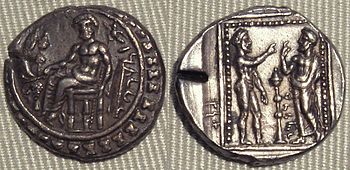- Datames
-
 Silver coin of Datames.
Silver coin of Datames.
Obv:The God Baaltars on a throne, seated left, torsos facing, holding grapes, grain ear, and eagle in right hand, scepter in left hand, surrounded by the city walls.
Rev:The God Ana, naked, and Datames, face-to-face.Datames (in Greek Δατάμης; ruled 385 BC–killed 362 BC) was a general and satrap (provincial governor) of Cappadocia under the Persian empire. A Carian by birth, he was the son of Camissares by a Scythian or Paphlagonian[1] mother. His father being satrap of Cilicia under Artaxerxes II, and high in the favour of that monarch, Datames became one of the king's bodyguards; and having in this capacity distinguished himself in the war against the Cadusii, was appointed to succeed his father (who had fallen in that war) in the government of his province. Here he distinguished himself both by his military abilities and his zeal in the service of the king; and reduced to subjection two officials who had revolted from Artaxerxes, Thyus, governor of Paphlagonia, and Aspis of Cataonia.
He was in consequence entrusted by the Persian king with the chief command of a force designed for the recovery of Egypt; but the machinations of his enemies at the Persian court, and the risks to which he was in consequence exposed, induced him to change his plan, and throw off his allegiance to the king (c.370 BC). He withdrew with the troops under his command into Cappadocia, and made common cause with the other satraps who had revolted from Persia (the "Satraps' Revolt").
Artabazus, one of the generals that remained faithful to the king, advanced against him from Pisidia, but was entirely defeated. The great reputation that Datames had acquired induced Artaxerxes to direct his utmost exertions to effect his subjection, but Autophradates, who was sent against him with a large army, was obliged to retreat with heavy loss. Datames, however, though constantly victorious against open foes, ultimately fell a victim to treachery, and, after evading numerous plots that had been formed against his life, was assassinated at a conference by Mithridates, the son of Ariobarzanes, who had gained his confidence by assuming the appearance of hostility to the king.[2]
Datames appears to have obtained the highest reputation in his day for courage and ability in war, which caused his fame to extend even among the Greeks, though he did not come into personal collision with them. Cornelius Nepos (to whose biographical sketch we owe the only connected narrative of his life) calls him the bravest and most able of all non-Greek and non-Roman generals, except Hamilcar and Hannibal; but there is much confusion in the accounts transmitted to us, and it is difficult to assign the anecdotes of him recorded by Polyaenus to their proper place in his history. The chronology of the events related by Nepos is also very obscure; but according to that author and Diodorus it would appear that Datames must have died before Artaxerxes, probably 362 BC.
References
- Cornelius Nepos, Lives of Eminent Commanders, John Selby Watson (translator), (1886)
- Rüdiger Schmidt, Encyclopaedia Iranica, "Datames", online version, (1994)
- Peck, Harry Thurston; Harper's Dictionary of Classical Antiquities, "Datames", New York, (1898)
- Smith, William (editor); Dictionary of Greek and Roman Biography and Mythology, "Datames", Boston, (1867)
Notes
This article incorporates text from the public domain Dictionary of Greek and Roman Biography and Mythology by William Smith (1870).
Categories:- 362 BC deaths
- Achaemenid satraps of Cappadocia
- 4th-century BC rulers
Wikimedia Foundation. 2010.
